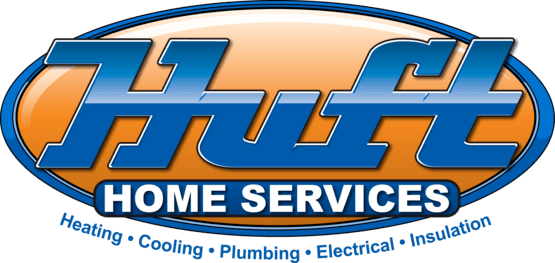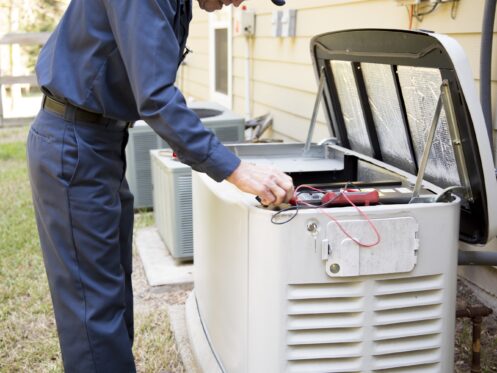With a whole-home generator, you never need to worry about what might happen when the power goes out. Picking one the right size ensures that you can run any appliances you need, like your fridge and freezer. It also provides power for your lights and allows you to charge devices like smartphones and tablets. At Huft Home Services, we can help you choose the right standby generator size and type.
Types of Standby Generator
Standby and backup generators refer to the same thing. This is a type of generator that provides power when you need it. If your home has an outage, the generator will kick on and power anything you run off it. While portable generators are handy for camping and short-term use, you need to fill them with fuel often to get the power you need because they are only designed to run for a few hours. A standby model is much larger, does not need to be filled as often, and has an automatic transfer switch. The transfer switch engages the motor when it detects an outage and automatically takes over supplying electricity to your home.
Another option you may have heard about is a prime generator. Typical applications are for use as remote power at a job site, off-grid home, or an RV. This type of generator can be your prime power source and operates continuously. However, due to cost, they are generally not practical for homeowners.
A backup generator is the best option for those living in and around Sacramento. We connect it to the electrical system in your home, which helps it determine when an outage starts. You can add one that runs on natural gas or liquid propane. The right fuel source gives you enough power to run your entire home for a few days or longer.
How Much Power Do You Need?
To figure out how much power you need, consider both the size of your home and the appliance and other items you need to use during an outage. Start with the essentials, which are the things you cannot live without. You’ll want to run your central AC or HVAC system during a hot California summer. Most of these systems use 3,000 to 4,000 watts. If you have any window AC units, each one will use 500 to 1,400 watts.
Some of the other essential items you need to use during a power outage and their wattage include:
- Refrigerator: 350 to 800 watts
- Freezer: 180 to 1,800 watts
- Water heater: 1,100 to 4,000 watts
- Sump pump: 1,000 to 4,100 watts
Check out each appliance to determine its starting and running wattage. While the starting wattage tells you how much power it uses when you turn it on or start it, the running wattage shows how much energy it uses as it works. If you use all of the appliances listed above, as well as a central AC system, you’ll need a generator that can support a minimum of 5,630 to a maximum of 14,700 watts.
You may need to run other appliances, like a stove, too. Most electric stoves use 2,000 to 5,000 watts. Even a gas stove will need a minimum of 1,200 watts of power. A microwave uses up to 1,000 watts, while a dishwasher can add up to 2,400 to your total figure. Don’t forget that you’ll need a minimum of 850 watts to run your washer and 1,800 for your dryer.
We also recommend that you factor in the power needed for any extras like your computer or entertainment systems. If you work from home or want the ability to play on your game console during an outage, you’ll need to add up to 70 watts to your total amount. Your modem and router that help you go online and use WiFi in your home use a minimum of 5 watts of power. The security cameras that keep your home safe use up to 20 watts.
To figure out the best whole-home generator size, don’t forget about starting watts. You will need to add starting watts to the total running watts of all the appliances and devices you want to work during a power outage. For example, you might need a generator that can produce 15,000 watts when grid power fails but only 10,000 watts once you are up and running.
Is There Anything Else to Consider?
While knowing the size you need is helpful, there are other things to consider before buying a home generator. The transfer switch that runs the generator comes in two different types. One is a switch that connects to the main control panel. As soon as the power goes out, it tells your home to stop using power from its internal system and instead use your generator. You can also opt for a sub-panel that tells the generator where to send its power. This allows you to divert power to your refrigerator and other kitchen appliances rather than sending it to every room if you opt for a smaller generator.
Consider the fuel source, too. We usually recommend that you pick a generator that works with the fuel source you already have in your home, if possible. If you have municipal natural gas lines that power your stove and other appliances, we can set up that line to work with the generator. Propane is another popular choice. We can run a line from the propane tank outside to your generator when we connect it to your home and install the transfer switch.
Don’t forget about the price either. These generators often start at around $3,000 and go up from there. Make sure that you pick one that is big enough to power your home. You don’t want to buy a cheaper model and find that it can only run a few of your appliances but not your lights or any outlets. We’ll work with you to help you find a model that fits your budget.
How Do Whole Home Generators Compare to Portable Ones
You have quite a few options when it comes to portable generators. Some larger portable generators will power some of your appliances when the power goes out. They can power the bare essentials like refrigerators and water pumps but will not have the capacity to provide electricity to everything. They also must be kept outside, are noisy, and you will have to use extension cords to plug in the items you want to be powered. In addition, they require gas or diesel to run. This is a disadvantage because most homeowners do not have ample supplies of these fuels, and most portable models will need refilling every four to five hours.
Get Help Picking a Generator Size
Here at Huft Home Services, we have been serving the residents of Elk Grove, CA since 2004. We install, maintain and repair cooling and heating systems. In addition, our technicians are expert plumbers and electricians.
We can help you choose a generator to meet your budget and the specific needs of your household. Contact Huft Home Services today so we can get started!



